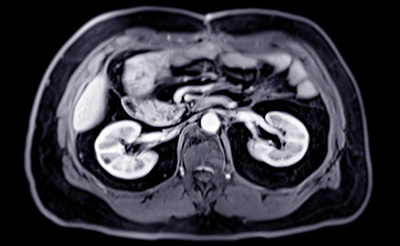
Our program is designed to provide advanced training in the use of magnetic resonance imaging for the diagnosis and management of a variety of conditions affecting the abdomen and pelvis.
Clinical Training
The Body MRI fellow will be exposed to a large volume of body MRI cases including:
- MRI of the chest, abdomen, and pelvis
- MRA of the chest, abdomen, pelvis, lower extremities, and upper extremities
- Dynamic pelvic imaging to assess for pelvic floor instability
- Dynamic lung imaging to evaluate pulmonary biomechanics and to assess for chronic interstitial lung disease
- Functional imaging of the pancreas
- MRI urography
- Whole body MRI to evaluate patients with prostate cancer and multiple myeloma
Imaging Modalities
Additionally, the fellows will receive training in the interpretation of other imaging modalities of the body including:
- CT of the chest, abdomen, and pelvis
- PET-CT
- Ultrasound and ultrasound-guided procedures
- Fluoroscopy
- Plain film interpretation
At the end of the one-year fellowship, the fellow should be able to demonstrate the following skills and competencies:
- Interpreting cross-sectional MR imaging of the body
- Performing and interpreting fluoroscopic procedures
- Performing ultrasound-guided procedures including thoracentesis, paracentesis, and biopsies
- Comprehensive knowledge of the physics of ultrasound, CT, and MR imaging and an ability to apply this knowledge for image optimization and for quality assurance issues
- Patient care in the areas of consultation particularly in multidisciplinary conferences, patient safety, and diagnostic and therapeutic procedures
- Proficiency in protocoling exams
Teaching and Mentorship
Fellows actively participate in a wide range of interdisciplinary conferences and tumor boards, providing a critical learning opportunity for managing complex cases. Our department is engaged in the following multidisciplinary collaborations:
Academic and Research Opportunities
Body MRI Fellows are given the opportunity to participate in research and technology development with at least one academic day per week. All trainees are required to participate in at least one scholarly project. Fellows can participate in one or several of the following project types: laboratory research, clinical research, image interpretation, imaging techniques, or practice management issues. Within the department, the fellows will be offered opportunities to participate in on-going basic and translational research.
Within the field of MR imaging of the body, the Abdominal Division is actively engaged in several translational research projects. Such examples include quantitative measuring of hepatic fibrosis, spectroscopic measurement of iron and fat composition within the liver, dynamic pelvic imaging to assess for pelvic floor instability, and dynamic MR imaging of the lungs.
Clinical research meetings for fellows and attendings are held monthly. Fellows are encouraged to author publications and to present at meetings. All publications and presentations will be written with faculty guidance. Additionally, when presentations are accepted at national meetings, departmental funding is often available to support travel and related expenses.
Learn more about research opportunities in the Department of Medical Imaging.
Program Resources
Fellows and residents have access to a wide range of health sciences information resources through the Health Sciences Library. Access to countless full-text journals is available the University of Arizona Health Sciences campus library catalog. This comprehensive resource also provides comfortable space for small group collaborations and quiet studying in a collegial atmosphere.
The program also incorporates evidence-based medicine tools including EBM search, a search engine that provides access to evidence-based medicine, the Cochrane Library, ACP Pier, BMJ Clinical Evidence, and Clinical Practice Guidelines. Additionally, fellows have access to STATRef, the premier healthcare e-resource.
Please note: the Fellow Candidate must be eligible to obtain an Arizona Medical License prior to the start of the program.
- Fellowship Application (download above)
- Curriculum Vitae formatted to include month/year for all educational and employment periods; please address any gaps in time.
- Personal Statement
- Medical School Transcripts
- Medical Student Performance Evaluation (MSPE)
- Three current letters of recommendation (LOR), dated no more than 12 months prior to the application date. Each letter should be on official letterhead and signed by the reference giver.
- Pass on The United States Medical Licensing Examination (USMLE) Step 1, Step 2 and Step 3
- Photo
- Visa Status, if applicable
- ECFMG Certificate, if applicable


